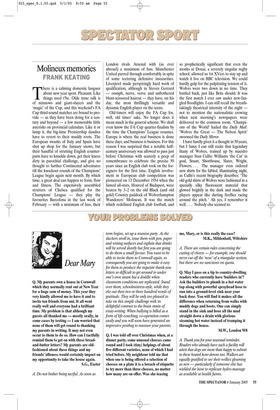Molineux memories
FRANK KEATING
There is a calming domestic languor about new year sport. Pleasant. Like things used t’be. Olde tyme talk is of minnows and giant-slayers and the ‘magic’ of the Cup, and this weekend’s FA Cup third-round matches are bound to provide — as they have been doing for a century and beyond — a few memorable little asterisks on provincial calendars. Like it or lump it, the big-time Premiership dandies have to revert to their muddy roots. The European swanks of Italy and Spain have shut up shop for the January snows, but their handful of strutting English counterparts have to knuckle down, get their knees dirty in parochial challenge, and give no thought to further Continental adventures till the knockout rounds of the Champions’ League begin again next month. By which time, a great deal can happen to form, flow and fitness. The expensively assembled strutters of Chelsea qualified for the Champions’ League — they play the favourites Barcelona in the last week of February — with a minimum of fuss, their London rivals Arsenal with (as ever abroad) a maximum of fuss. Manchester United purred through comfortably in spite of some teetering defensive insecurities. Liverpool made perspiringly hard work of qualification, although in Steven Gerrard — oomph, nerve, verve and unbothered blunt-scissored haircut — they have, on his day, the most thrillingly versatile and dynamic English player on the scene.
Old-timers will enjoy the FA Cup for, well, old times’ sake. No longer does it mean much in the general scheme. We shall even know the FA Cup quarter-finalists by the time the Champions’ League resumes. Europe is where the real business is done these days; and business is business. For this reason I was surprised that a notable halfcentury anniversary was allowed to pass just before Christmas with scarcely a peep of remembrance to celebrate the precise 50 years since an English club took on the foreigners for the first time. English involvement in European club competition was pioneered on 13 December 1954 when the famed all-stars, Honved of Budapest, were beaten by 3–2 on the old Black (and old gold) Country paddock of Wolverhampton Wanderers’ Molineux. It was the match which redefined English club football, and so prophetically significant that even the monks at Douai, a severely singular rugby school, allowed us 1st XVers to stay up and watch it live on BBC television. We could hardly gulp for the palpitating tension of it. Wolves were two down in no time. They battled back, just like Brits should. It was the first match I ever saw under new-fangled floodlights. I can still recall the breathtakingly theatrical intensity of the night not to mention the nationalistic crowing when next morning’s newspapers were delivered to the common room. ‘Champions of the World’ hailed the Daily Mail. ‘Wolves the Great — The Nelson Spirit’ swooned the Daily Mirror.
I have hardly given it a thought in 50 years, but I fancy I can still recite that legendary litany of Wolves, trained up by maestro manager Stan Cullis: Williams ‘the Cat’ in goal, Stuart, Shorthouse, Slater, Wright, Flowers.... The manager even ordered new shirts for the fabled, illuminating night, as Cullis’s recent biography describes: ‘The old gold shirts of Wolves were fashioned in a specially silky fluorescent material that glowed brightly in the dark and made the players appear like darting fireflies racing around the pitch. ’ Ah yes, I remember it well.... Nobody else seemed to.










































 Previous page
Previous page